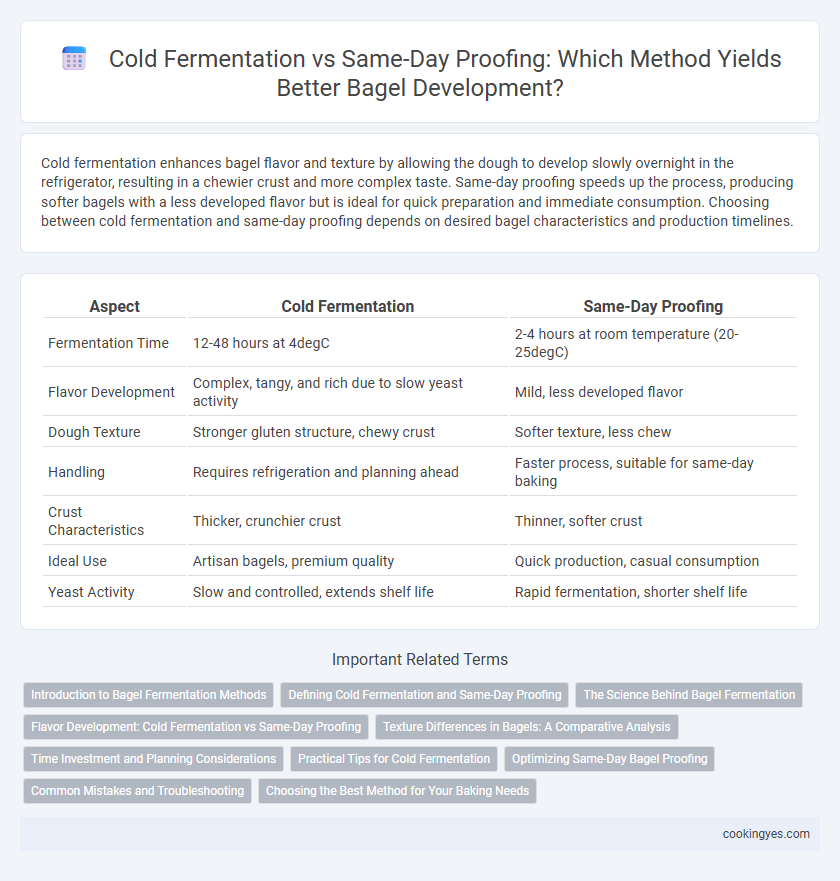Cold fermentation enhances bagel flavor and texture by allowing the dough to develop slowly overnight in the refrigerator, resulting in a chewier crust and more complex taste. Same-day proofing speeds up the process, producing softer bagels with a less developed flavor but is ideal for quick preparation and immediate consumption. Choosing between cold fermentation and same-day proofing depends on desired bagel characteristics and production timelines.
Table of Comparison
| Aspect | Cold Fermentation | Same-Day Proofing |
|---|---|---|
| Fermentation Time | 12-48 hours at 4degC | 2-4 hours at room temperature (20-25degC) |
| Flavor Development | Complex, tangy, and rich due to slow yeast activity | Mild, less developed flavor |
| Dough Texture | Stronger gluten structure, chewy crust | Softer texture, less chew |
| Handling | Requires refrigeration and planning ahead | Faster process, suitable for same-day baking |
| Crust Characteristics | Thicker, crunchier crust | Thinner, softer crust |
| Ideal Use | Artisan bagels, premium quality | Quick production, casual consumption |
| Yeast Activity | Slow and controlled, extends shelf life | Rapid fermentation, shorter shelf life |
Introduction to Bagel Fermentation Methods
Cold fermentation allows bagels to develop complex flavors and a chewier texture by fermenting the dough slowly at low temperatures, typically 12-24 hours. Same-day proofing accelerates the process, producing bagels with a softer crumb and milder taste due to shorter fermentation times, usually 1-3 hours. Choosing between cold fermentation and same-day proofing depends on the desired flavor profile and texture, balancing production time with traditional quality.
Defining Cold Fermentation and Same-Day Proofing
Cold fermentation involves refrigerating the bagel dough for 12 to 48 hours, allowing slower yeast activity and enhanced flavor complexity through extended enzymatic reactions. Same-day proofing speeds up the process by letting the dough rise at room temperature for 1 to 2 hours, resulting in a softer texture but less developed taste. Both techniques influence gluten structure and fermentation acids, directly affecting bagel density and chewiness.
The Science Behind Bagel Fermentation
Cold fermentation enhances bagel flavor and texture by slowing yeast activity, allowing organic acids and enzymes more time to develop complex aromas and a chewy crumb. Same-day proofing accelerates fermentation, producing milder taste and softer texture due to limited acid production and gluten development. Controlling fermentation temperature and time is critical for optimizing bagel dough's gas retention and crust formation, directly impacting the final product's sensory qualities.
Flavor Development: Cold Fermentation vs Same-Day Proofing
Cold fermentation enhances bagel flavor development by allowing extended enzyme activity and yeast fermentation, resulting in a richer, more complex taste profile with subtle sour notes. Same-day proofing produces a milder flavor as the shorter fermentation time limits the breakdown of starches and sugars, leading to a less developed crust and crumb structure. Bakers seeking intense chewiness and depth often prefer cold fermentation for superior bagel quality.
Texture Differences in Bagels: A Comparative Analysis
Cold fermentation enhances bagel texture by allowing extended yeast activity, resulting in a chewier crumb and a denser, more complex structure. Same-day proofing produces a softer, less resilient interior with a lighter crust, as the shorter fermentation limits gluten development. The contrast in texture is primarily due to fermentation time influencing dough hydration and gluten network strength.
Time Investment and Planning Considerations
Cold fermentation for bagel dough requires extended time investment, often 12 to 24 hours, allowing complex flavor development and improved texture through slow yeast activity. Same-day proofing compresses the fermentation into a few hours, demanding precise temperature control but enabling rapid production with less advanced planning. Bakers must balance time availability and desired flavor profile when choosing between cold fermentation and same-day proofing methods.
Practical Tips for Cold Fermentation
Cold fermentation enhances bagel flavor by allowing the dough to develop complex organic acids and sugars over 12 to 24 hours at 38degF (3degC), resulting in a chewier texture and deeper crust color. To optimize cold fermentation, portion the dough after mixing, cover tightly to prevent drying, and avoid exceeding 48 hours to prevent over-fermentation and sourness. Cold-fermented bagels benefit from a brief warm proof at room temperature before boiling and baking, ensuring proper rise and chewy interior.
Optimizing Same-Day Bagel Proofing
Optimizing same-day bagel proofing requires precise temperature control and hydration levels to achieve the desired chewy texture and glossy crust. Maintaining proofing times between 1.5 to 2 hours at around 75degF accelerates yeast activity, enhancing oven spring without compromising crumb structure. Adjusting dough formulations to increase malt content can boost caramelization during boiling and baking, delivering authentic flavor and color in fast-paced bakery environments.
Common Mistakes and Troubleshooting
Cold fermentation enhances bagel flavor and texture by allowing slow yeast activity, but common mistakes include underproofing and over-chilling, which can lead to dense or overly sour results. Same-day proofing risks uneven fermentation and insufficient flavor development, often causing bagels to be less chewy and flavorful. Troubleshooting involves adjusting proofing times and temperatures, ensuring proper dough hydration, and monitoring yeast activity to balance fermentation for optimal bagel quality.
Choosing the Best Method for Your Baking Needs
Cold fermentation enhances bagel flavor and texture by allowing dough to develop slowly over 12 to 24 hours, resulting in a chewier crumb and richer taste. Same-day proofing speeds up the process within 2 to 3 hours, ideal for quick production but can yield a less complex flavor profile and softer texture. Bakers should choose cold fermentation for artisanal quality and deeper flavor, or same-day proofing for efficiency and faster turnaround.
Cold fermentation vs same-day proofing for bagel development Infographic

 cookingyes.com
cookingyes.com